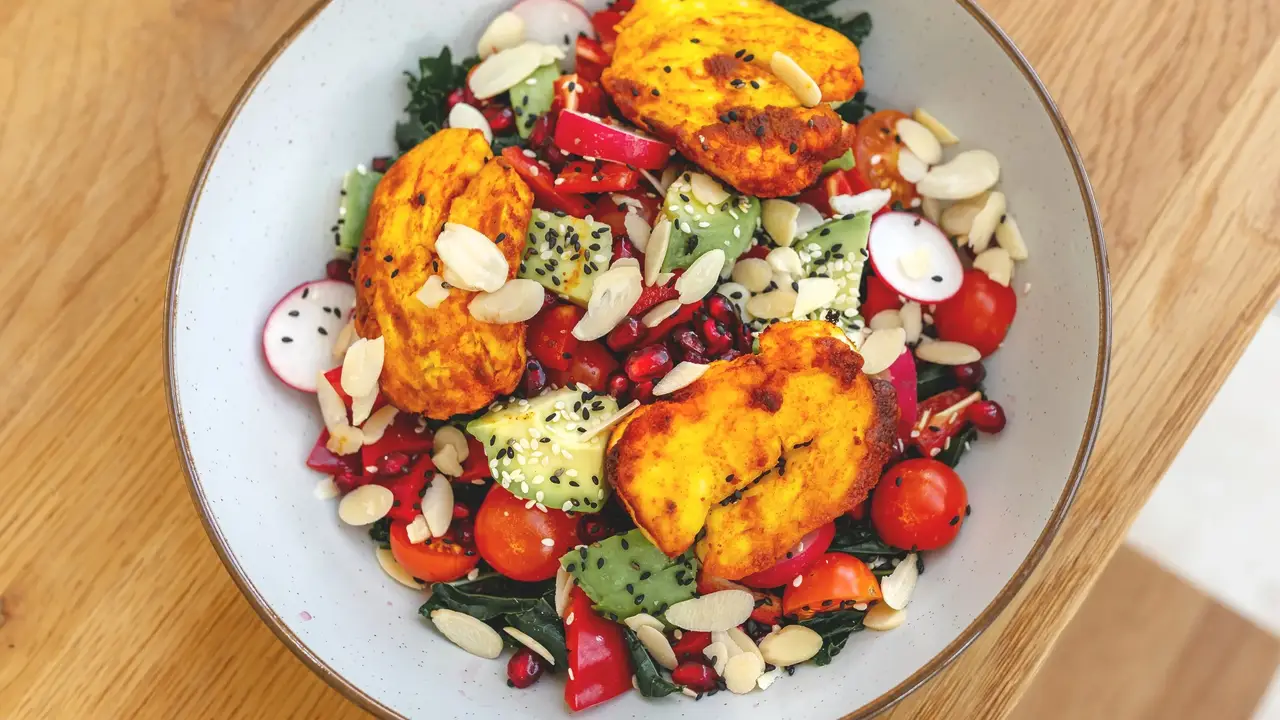Autumn Harvest Recipes for Gut Health
Nourish your gut with delicious autumn harvest recipes. Discover seasonal ingredients that support digestive wellness.

Nourish your gut with delicious autumn harvest recipes. Discover seasonal ingredients that support digestive wellness.
Autumn Harvest Recipes for Gut Health
As the leaves turn golden and the air grows crisp, autumn brings a bounty of delicious, nutrient-rich produce perfect for supporting a healthy gut. This season is a fantastic time to embrace foods that are naturally high in fiber, prebiotics, and probiotics, all essential for a thriving microbiome. Forget bland diets; we're talking about vibrant, flavorful dishes that will make your taste buds sing and your gut happy.
Why Autumn Produce is a Gut Health Powerhouse
Autumn's harvest is uniquely suited for gut health. Many seasonal vegetables and fruits are packed with soluble and insoluble fibers, which are crucial for digestive regularity and feeding beneficial gut bacteria. Think about the rich colors of pumpkins, squash, apples, and root vegetables – these often indicate a high concentration of antioxidants and polyphenols, compounds that also play a significant role in reducing inflammation and supporting a diverse microbiome. Furthermore, the cooler weather often encourages us to cook more, allowing for slow-cooked dishes and fermented foods that are incredibly beneficial for digestion.
Top Autumn Ingredients for a Happy Gut
Let's dive into the stars of the autumn gut-health show:
Pumpkin and Squash Gut Friendly Fall Favorites
These vibrant orange powerhouses are more than just festive decorations. They are rich in fiber, particularly soluble fiber, which helps to bulk up stool and promote regular bowel movements. They also contain beta-carotene, a powerful antioxidant that converts to Vitamin A, supporting gut lining integrity. Think roasted pumpkin, butternut squash soup, or even pumpkin puree in smoothies.
Apples and Pears Pectin Rich Gut Boosters
An apple a day keeps the doctor away, and it might just keep your gut happy too! Apples and pears are excellent sources of pectin, a type of soluble fiber that acts as a prebiotic, feeding beneficial gut bacteria. They also contain polyphenols that have anti-inflammatory effects. Enjoy them raw, baked, or in compotes.
Root Vegetables Carrots Sweet Potatoes Beets Digestive Support
Carrots, sweet potatoes, parsnips, and beets are fantastic sources of complex carbohydrates and fiber. Sweet potatoes, in particular, are rich in resistant starch when cooked and cooled, which acts as a prebiotic. Beets offer betalains, unique antioxidants with anti-inflammatory properties. Roasting these vegetables brings out their natural sweetness and makes them incredibly digestible.
Cruciferous Vegetables Brussels Sprouts Cabbage Kale Gut Cleansers
While some find them gassy, cruciferous vegetables like Brussels sprouts, cabbage, and kale are incredibly beneficial for gut health. They contain glucosinolates, compounds that support detoxification pathways in the liver and gut. Start with smaller portions if you're new to them, and try roasting or steaming to make them easier to digest.
Fermented Foods Sauerkraut Kimchi Kefir Probiotic Powerhouses
Autumn is a great time to incorporate more fermented foods. Sauerkraut and kimchi, made from cabbage, are packed with probiotics that introduce beneficial bacteria directly into your gut. Kefir, a fermented dairy or non-dairy drink, is another excellent source of diverse probiotic strains. These foods are crucial for maintaining a balanced microbiome.
Delicious Autumn Gut Health Recipes
Now for the fun part – putting these ingredients to good use!
Roasted Butternut Squash and Apple Soup
This creamy, comforting soup is packed with fiber and antioxidants. Roast butternut squash and apples with a touch of cinnamon and nutmeg until tender. Blend with vegetable broth and a splash of coconut milk for creaminess. Garnish with toasted pumpkin seeds for extra crunch and healthy fats.
Autumn Harvest Salad with Maple Tahini Dressing
Combine roasted Brussels sprouts, sweet potato cubes, and thinly sliced apples with mixed greens. Add some toasted pecans or walnuts for healthy fats. Whisk together tahini, maple syrup, apple cider vinegar, and a little water for a creamy, tangy dressing. This salad is a fiber and nutrient bomb!
Spiced Pumpkin and Lentil Stew
A hearty and warming stew perfect for a chilly evening. Sauté onions, garlic, and ginger, then add diced pumpkin, lentils, vegetable broth, and warming spices like cumin, coriander, and turmeric. Lentils are an excellent source of plant-based protein and fiber, making this a gut-friendly and satisfying meal.
Homemade Sauerkraut or Kimchi
Making your own fermented foods is incredibly rewarding and ensures you're getting live, active cultures. All you need is cabbage, salt, and a jar. There are countless recipes online for both sauerkraut and kimchi. Start with a small batch and enjoy the probiotic benefits with every meal.
Apple Cinnamon Baked Oats
For a gut-friendly breakfast, combine rolled oats, grated apple, cinnamon, chia seeds, and a plant-based milk. Bake until set. Oats are a fantastic source of beta-glucan, a soluble fiber that supports gut health and helps regulate blood sugar. Chia seeds add extra fiber and omega-3s.
Integrating Gut-Friendly Products and Supplements
Beyond whole foods, certain products and supplements can further support your gut health journey. It's important to choose high-quality options and consult with a healthcare professional before adding new supplements to your routine.
Probiotic Supplements Choosing the Right Strain
Probiotic supplements introduce beneficial bacteria directly into your gut. The key is to find a reputable brand with diverse strains and a high CFU (colony-forming units) count. Different strains offer different benefits, so consider your specific needs (e.g., for digestion, immunity, or mood).
Product Recommendations for Probiotic Supplements:
- Garden of Life Dr. Formulated Probiotics Once Daily Ultra: This product offers 90 billion CFUs and 15 diverse probiotic strains, including Lactobacillus acidophilus and Bifidobacterium lactis. It's shelf-stable and designed for broad-spectrum gut support.
- Culturelle Digestive Daily Probiotic: A popular choice, Culturelle contains Lactobacillus rhamnosus GG, one of the most studied probiotic strains. It's excellent for daily digestive maintenance and occasional digestive upset.
- Seed DS-01 Daily Synbiotic: This is a more premium option, combining 24 clinically studied probiotic strains with a prebiotic compound. It's designed for comprehensive gut, skin, and cardiovascular health.
Comparison and Usage:
Garden of Life is great for those looking for a high-potency, multi-strain option. It's a good all-rounder for general gut health. Culturelle is a solid choice for beginners or those focusing on specific digestive issues, thanks to its well-researched single strain. Seed DS-01 is for the biohacker looking for a more advanced, broad-spectrum approach, often at a higher price point. Always take probiotics as directed, usually with food, and store them according to instructions (some require refrigeration).
Approximate Pricing:
- Garden of Life: $30-$50 for a 30-day supply.
- Culturelle: $20-$35 for a 30-day supply.
- Seed DS-01: $50-$60 for a 30-day supply (subscription model often available).
Prebiotic Fiber Supplements Fueling Your Gut Bacteria
Prebiotics are non-digestible fibers that feed your beneficial gut bacteria. While you get them from food, a supplement can help ensure adequate intake, especially if your diet is lacking. Common prebiotics include inulin, FOS (fructooligosaccharides), and GOS (galactooligosaccharides).
Product Recommendations for Prebiotic Fiber Supplements:
- NOW Foods Inulin Pure Powder: A simple, cost-effective way to add prebiotic fiber. Inulin is derived from chicory root and is a well-known prebiotic.
- Thorne Research FiberMend: This product offers a blend of soluble fibers, including larch arabinogalactan and citrus pectin, which are gentle on the stomach and support gut integrity.
- Renew Life Ultimate Flora Critical Care Prebiotic: While primarily a probiotic, some Renew Life products also incorporate prebiotics, offering a synergistic effect. Look for their specific prebiotic blends.
Comparison and Usage:
NOW Foods Inulin is a straightforward, budget-friendly option for increasing general prebiotic intake. Thorne Research FiberMend is a more sophisticated blend, often recommended for those with sensitive guts or specific gut lining support needs. When using prebiotic powders, start with a small dose and gradually increase to avoid gas and bloating, as your gut adjusts. Mix into water, smoothies, or food.
Approximate Pricing:
- NOW Foods Inulin: $10-$20 for a large container.
- Thorne Research FiberMend: $30-$45 for a container.
- Renew Life Prebiotic blends: $25-$40.
Digestive Enzymes Supporting Nutrient Absorption
Digestive enzymes help break down food into smaller, absorbable nutrients. If you experience bloating, gas, or indigestion after meals, especially with rich autumn foods, an enzyme supplement might be beneficial. They can help your body process fats, proteins, and carbohydrates more efficiently.
Product Recommendations for Digestive Enzymes:
- Enzymedica Digest Gold: This is a highly popular and potent enzyme blend, containing a wide spectrum of enzymes for breaking down fats, proteins, carbs, and fiber.
- NOW Foods Super Enzymes: A comprehensive and affordable enzyme blend that includes betaine HCl for stomach acid support, as well as various enzymes.
- Doctor's Best Best Digestive Enzymes: Another well-regarded option, offering a broad range of enzymes to support overall digestion.
Comparison and Usage:
Enzymedica Digest Gold is often considered a top-tier product for its potency and effectiveness, suitable for those with significant digestive challenges. NOW Foods Super Enzymes provides a good balance of enzymes and stomach acid support at a more accessible price point. Doctor's Best is a reliable mid-range option. Take digestive enzymes with your meals, usually right before or during the first bite, to help your body process the food you're about to eat.
Approximate Pricing:
- Enzymedica Digest Gold: $25-$40 for 45-90 capsules.
- NOW Foods Super Enzymes: $15-$25 for 90-180 capsules.
- Doctor's Best Best Digestive Enzymes: $20-$35 for 90-180 capsules.
Bone Broth and Collagen Gut Lining Support
Bone broth and collagen supplements are rich in amino acids like glycine, proline, and glutamine, which are crucial for repairing and maintaining the integrity of the gut lining. A healthy gut lining acts as a barrier, preventing undigested food particles and toxins from entering the bloodstream.
Product Recommendations for Bone Broth/Collagen:
- Kettle & Fire Bone Broth: A widely available and high-quality ready-to-drink bone broth, made from grass-fed bones. Convenient for sipping or using as a base for soups.
- Vital Proteins Collagen Peptides: A very popular and versatile collagen powder that dissolves easily in hot or cold liquids. Sourced from grass-fed, pasture-raised bovine.
- Ancient Nutrition Multi Collagen Protein: Offers five types of collagen from various sources (bovine, chicken, fish, eggshell membrane) for comprehensive support.
Comparison and Usage:
Kettle & Fire Bone Broth is excellent for convenience and provides a holistic nutrient profile. It's great for daily sipping or as a soup base. Vital Proteins Collagen Peptides is a fantastic choice for adding collagen to coffee, smoothies, or baked goods without altering taste or texture. Ancient Nutrition Multi Collagen is for those who want a broader spectrum of collagen types. Incorporate these daily for best results, especially if you're working on gut lining repair.
Approximate Pricing:
- Kettle & Fire Bone Broth: $7-$10 per carton.
- Vital Proteins Collagen Peptides: $25-$45 for a large tub.
- Ancient Nutrition Multi Collagen Protein: $30-$50 for a large tub.
Lifestyle Factors for Optimal Gut Health
Beyond food and supplements, several lifestyle factors significantly impact your gut microbiome. Don't overlook these crucial elements:
Stress Management Gut Brain Axis Connection
The gut-brain axis is real! Chronic stress can negatively impact gut motility, increase gut permeability, and alter the composition of your microbiome. Incorporate stress-reducing practices like meditation, yoga, deep breathing, or spending time in nature. Autumn's calm atmosphere is perfect for this.
Adequate Sleep Circadian Rhythm Gut Health
Lack of sleep can disrupt your circadian rhythm, which in turn affects your gut microbiome. Aim for 7-9 hours of quality sleep per night. Establish a consistent sleep schedule, create a relaxing bedtime routine, and ensure your bedroom is dark and cool.
Regular Movement Physical Activity Digestive Flow
Physical activity helps stimulate gut motility and can reduce constipation. It also has a positive impact on stress levels and overall well-being. Enjoy autumn walks, hikes, or indoor exercises to keep your body moving and your gut flowing.
Hydration Water Intake Gut Function
Water is essential for healthy digestion. It helps break down food, absorb nutrients, and keep stool soft, preventing constipation. Aim for at least 8 glasses of water a day, more if you're active or consuming a lot of fiber.
Putting It All Together for a Thriving Gut
Embracing autumn harvest for gut health isn't about strict rules or deprivation. It's about celebrating the season's bounty and making conscious choices that nourish your body from the inside out. By focusing on fiber-rich fruits and vegetables, incorporating fermented foods, and considering targeted supplements when needed, you can cultivate a thriving gut microbiome. Remember, a healthy gut is the foundation for overall well-being, impacting everything from your immune system to your mood. So, get cooking, enjoy the flavors of fall, and give your gut the love it deserves!
:max_bytes(150000):strip_icc()/277019-baked-pork-chops-with-cream-of-mushroom-soup-DDMFS-beauty-4x3-BG-7505-5762b731cf30447d9cbbbbbf387beafa.jpg)






